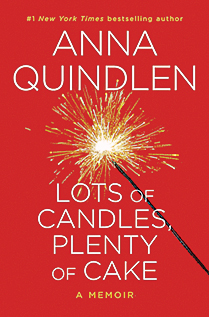 In her memoir, the American journalist and Pulitzer Prize winner contemplates her life through a variety of lenses including motherhood, marriage and friendship. But the book is in no way a lament for days gone by. Rather, Quindlen crafts a witty and poignant homage to lessons learned and experiences gained—and even better, she offers a toast to the future.
In her memoir, the American journalist and Pulitzer Prize winner contemplates her life through a variety of lenses including motherhood, marriage and friendship. But the book is in no way a lament for days gone by. Rather, Quindlen crafts a witty and poignant homage to lessons learned and experiences gained—and even better, she offers a toast to the future.
Quindlen, who for years wrote a popular New York Times column about being a working mom, is a master of clever word twists that contain the wisdom that comes only with age. Petty marital disagreements, she says, are like hothouse tomatoes: “They get way bigger than they ought to, and they bear little resemblance to the real thing.” Of the pressure to maintain a youthful appearance, Quindlen writes that “women were once permitted a mourning period for their faces; it was called middle-age. Now . . . we have the science of embalming disguised as grooming.”
These notes are as much personal truisms as they are social commentaries. Quindlen takes on a number of loaded topics. The secret to an enduring marriage, for example, lies in realizing that it is bigger than both spouses. “It’s also families, friends, traditions, landmarks, knowledge, history. It’s children.” For all the merits of the feminist revolution, she admits that many women got more than they bargained for—80-hour work weeks, plus time spent in the kitchen, the car, at the athletic field and overseeing homework or housework. Young women today who want a different life aren’t ungrateful; they’re sane.
Quindlen is a devoted learner. For years, she could not do a headstand, was petrified, in fact, to attempt it the way her yoga instructor insisted. One day, she figured out her own method. Upside-down in her bedroom and more than 50 years into her life, Quindlen realized that she had literally learned a new trick. She was, in other words, still alive.
At its best, Lots of Candles offers an invigorating and optimistic view on aging, so contrary to the cultural construct that says getting old is nothing but doom and dread. “We are supposed to think younger is better,” writes Quindlen. “But we know deep inside, in the ways that count, that better is now.”